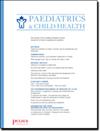Healthcare professionals’ perspectives on optimizing pain care-related education at a Canadian children’s hospital: A qualitative study
IF 1.8
4区 医学
Q2 PEDIATRICS
引用次数: 0
Abstract
Abstract Objectives Pain affects all children and youth, yet acute and procedural pain remains undertreated in Canadian hospitals. To improve pain management practices in paediatric hospitals, it is necessary to understand how healthcare professionals (HCPs) wish for educational interventions to be designed to improve their pain management practice. Methods Semi-structured interviews were conducted with 18 HCPs between October and December 2020. Snowball sampling was used to first recruit interested members from the hospital’s Pediatric Pain Management Committee. Interviews were conducted per participant preference and included Zoom, telephone, and in-person interviews. Recruitment ceased when data were determined sufficiently rich. A thematic analysis of verbatim transcripts and reflexive field notes were used to create a data set focused on knowledge mobilization and clinical education. Results Three core themes were identified: (a) the necessity for just-in-time education for HCPs; (b) the availability of clinical pain champions to educate staff; and (c) the provision of resources to educate children and their families about available pain management interventions. Just-in-time education included suggestions for in-service training, hands-on training, and regular updates on the latest research. Pain champions, including clinical nurse educators, were stressed as being important in motivating staff to improve their pain management practices. Participants noted the lack of resources for patient and family education on pain management and suggested providing more multimodal resources and educational opportunities. Conclusion Having local champions introduce pain management initiatives and just-in-time education positively impacts the implementation climate, which also helps HCPs provide evidence-based education and resources to patients and families.加拿大一家儿童医院的医疗保健专业人员对优化疼痛护理相关教育的看法:一项定性研究
摘要目的疼痛影响所有儿童和青少年,但急性和程序性疼痛在加拿大医院仍然治疗不足。为了改善儿科医院的疼痛管理实践,有必要了解医疗保健专业人员(HCPs)希望如何设计教育干预措施来改善他们的疼痛管理实践。方法于2020年10月至12月对18名医护人员进行半结构化访谈。雪球抽样首先用于从医院的儿科疼痛管理委员会招募感兴趣的成员。访谈是根据参与者的偏好进行的,包括Zoom、电话和面对面访谈。当确定数据足够丰富时,招聘就停止了。对逐字抄本和反思性实地记录的专题分析用于创建一个侧重于知识调动和临床教育的数据集。结果确定了三个核心主题:(a)对卫生专业人员进行及时教育的必要性;(b)有无临床疼痛倡导者对工作人员进行教育;(c)提供资源,教育儿童及其家人有关可用的疼痛管理干预措施。即时教育包括对在职培训、实践培训的建议,以及定期更新最新研究成果。包括临床护理教育者在内的疼痛倡导者被强调为激励员工改善疼痛管理实践的重要因素。与会者注意到缺乏对病人和家属进行疼痛管理教育的资源,并建议提供更多的多模式资源和教育机会。结论由当地领军者引入疼痛管理倡议和及时教育对实施氛围产生积极影响,这也有助于HCPs向患者和家庭提供循证教育和资源。
本文章由计算机程序翻译,如有差异,请以英文原文为准。
求助全文
约1分钟内获得全文
求助全文
来源期刊

Paediatrics & child health
医学-小儿科
CiteScore
2.10
自引率
5.30%
发文量
208
审稿时长
>12 weeks
期刊介绍:
Paediatrics & Child Health (PCH) is the official journal of the Canadian Paediatric Society, and the only peer-reviewed paediatric journal in Canada. Its mission is to advocate for the health and well-being of all Canadian children and youth and to educate child and youth health professionals across the country.
PCH reaches 8,000 paediatricians, family physicians and other child and youth health professionals, as well as ministers and officials in various levels of government who are involved with child and youth health policy in Canada.
 求助内容:
求助内容: 应助结果提醒方式:
应助结果提醒方式:


